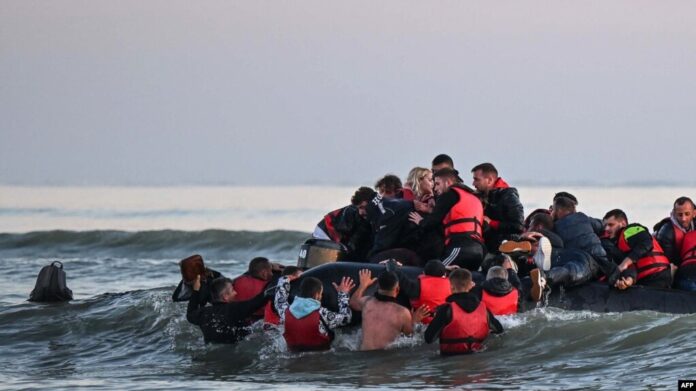Betrayal is like a plague for which there is no vaccine. It is with us forever, impossible to eradicate. Our times serve as an example of this; we see how the treacherous have once again sold out the world for thirty pieces of silver. We already know who they are, and we could list endless cases, with increasingly severe topics that determine or even reverse the fate of the Earth and our own. They also made sure to envelop us in the glittering web of the internet, embedding computers in people’s minds. Of course, it becomes easy to deceive us this way; lies, like a benevolent narcotic, help make us believe things that could ultimately lead to our downfall. And where does Europe stand in all this? It’s enough to think of the now past Paris Olympics. Despite the impressive performances of athletes who prepared, trained tirelessly, and fought to the point of exhaustion to embody the Olympic spirit of “Citius, Altius, Fortius!” – “Faster, Higher, Stronger!” – France’s opinion about the Olympic Games and the world weighs heavily on the other side of the scale. Everyone can ponder the opening ceremony, the filthy Seine as the venue for swimming competitions, or the “male women” who beat their partners, but let’s pause here. It suffices to allow ourselves the criticism that the organization was at the very least innovative, memorable, confusing, and disheartening. A significant portion of the media dubbed the officially 33rd Summer Games as the “Woke Olympics.” Why would the epoch-making ideal of our time skip this? After all, “recycled communism” spares no one and nothing. It creeps under our pillows, lives with us, and destroys everything, even things we never thought could be attacked.
Even the poor Erythrina caffra, this brilliantly red-flowered wonder plant, a jewel of the African coastline, has suffered. The second part of the Latin name of the Kaffir Coral Tree comes from an Arabic term meaning “infidel,” which was long used as a derogatory term for people of color in South Africa. “This word carries a very violent, brutal, socially unjust history,” said a plant molecular biologist at Stellenbosch University regarding the issue. However, the term appears in the scientific names of over 200 plants, 13 algae, and 70 fungi. One can imagine the professional chaos that will ensue if the authorities decide to change these names. Even the popular begonia found in Hungarian gardens could face a similar fate if force triumphs over reason. Its namesake, Michel Bégon, was a colonial governor, which is why his name should be erased from the beloved flower – although it was named after this official, according to one possible explanation of the name’s origin. Solving the problem of negative connotations in names is not easy. The nomenclature committee of the International Botanical Congress, which meets every six years, has established a special committee to discuss the ethics of naming species. From 2026 onwards, any new species name deemed derogatory will be recommended for rejection. We have a suggestion right away: decision-makers should also consider how they could cleanse the present era with this new ideology, specifically by erasing or eliminating the problem itself – the former colony – from history.
Racist names also affect birds. The American Ornithological Society is already working on this: a new rule aims to change the names of 70 to 80 species in the United States and Canada. Soon, we might have to forget about Anna’s Hummingbird, Lewis’s Woodpecker, and even the Cedar Waxwing. “The Society pays particular attention to birds whose names are tied to historical injustices.”
“The ship of fools is captained by a goblin, Full steam ahead, toward the reef.” With these lyrics, a German nuclear energy engineer illustrated his country’s policy of pushing the deep green energy transition at the 16th conference of the European Institute for Climate and Energy (EIKE). The climate-skeptic conference, which started as a German event but is now global, took place in Maria Enzersdorf near Vienna in June, with participation from international organizations and renowned professors. What is now the world’s most significant climate and energy forum highlighted many extremely important facts that are often overlooked by the climate alarmists. A comprehensive professional report was prepared by László Csaba Szarka, a geophysicist and academician. The article is available online for anyone interested in this overexposed and distorted topic. It is a critical issue, literally and figuratively. The future outlook is frightening, but not because of the climate – rather because extreme sensitivity (wokeism) is gradually blinding and “woke-ifying” science itself. Its ardent supporters in this brave new world are already advocating that climate change should be registered as a cause of illness, even death. Synthetic or lab-grown meat will become mandatory, and in Ireland, 200,000 cattle have already been slaughtered for this reason. According to an American media report, the global panic over this issue, used as a political weapon, has gone so far as to attack the reality that “critical thinking leads to misinformation,” and that fact- and data-based approaches must be abandoned. The reality is inconvenient? No problem, let’s clear it out of the way!
For decades, we’ve been hearing that glaciers are slowly but surely melting, sea levels are rising, and cities will soon disappear from the map. However, at the aforementioned EIKE conference, the president of the American Heartland Institute pointed out that the ice mass in Antarctica is actually growing. And what about the Arctic? The Swedish daily Aftonbladet recently reported the following: About 40 Swedish scientists set out for the Arctic aboard the 13,000-ton icebreaker Oden. Their goal was to study the effects of climate change in the region, with a focus on ice melt and the impact of warmer air currents from the south. According to the researchers, the Arctic is the “canary” of climate change, where changes are more pronounced and warming occurs faster. This requires more accurate on-site information and more precise scientific models based on it – hence their expedition to the Arctic a few weeks ago. However, the Swedish scientists got stuck and eventually turned back from the far north. “The reason: too much ice and too many polar bears.” A meteorology professor from Stockholm University described the frozen water as a challenging issue. He also lamented that they didn’t find as many warm air currents as they had hoped. And the curious bears didn’t behave like tame pets. Once again, the pesky reality didn’t behave as the climate researchers had imagined. Perhaps the ice in the Arctic isn’t melting as quickly as we feared, and we don’t need to worry so much about the extinction of the white polar bears. Personally, I’m not sad about this at all. Long may they live and multiply – after all, this is their home. If they feel like it, they should go ahead and annoy the passing, intrusive scientists. When I think of them, one silly phrase comes to mind. I hope it’s woke-proof, not considered violent, socially unjust, or racist by anyone: “bumblers.”
Translated and edited by Gyöngyi Kiss




